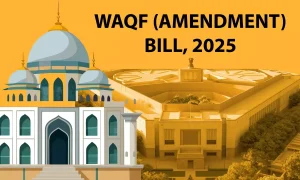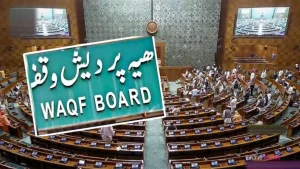Bihar – In a landmark political and legal development, the Rashtriya Janata Dal (RJD) has decided to challenge the controversial Waqf Amendment Act in the Supreme Court. This move of RJD to challenge Waqf Amendment Act, described by party leaders as both constitutional and moral, comes amid mounting criticism over the provisions of the amended law. The phrase “RJD to challenge Waqf Amendment Act” has quickly become a rallying cry among political observers, minority rights activists, and legal analysts alike.
The Waqf Amendment Act, which recently passed through the Parliament, has stirred significant public debate for allegedly diluting community autonomy, bypassing democratic consultations, and infringing upon fundamental rights. The RJD to challenge Waqf Amendment Act marks the first high-profile confrontation against the law and could set the stage for a pivotal constitutional interpretation.
This article explores the origins of the Waqf Amendment Act, RJD’s legal and political arguments, nationwide responses, and the implications of the case on India’s secular and legal landscape.
What is the Waqf Amendment Act?
The Waqf Amendment Act modifies key provisions of the original Waqf Act of 1995. The original legislation aimed to regulate and manage waqf properties—religious endowments in Islamic tradition that are intended for charitable or religious purposes. These properties, once registered, are held under the custody of state Waqf Boards.
Under the new Waqf Amendment Act, the central government has allegedly assumed greater control over the administration, de-registration, and financial management of waqf properties. Critics argue this undermines the role of local communities and religious boards, and it opens the door for misuse and central overreach.
The RJD to challenge Waqf Amendment Act signifies an open confrontation with these sweeping changes. Party leaders have stated that such centralization goes against the spirit of federalism and community autonomy.
Key Changes in the Amendment

The amended Waqf law includes several controversial provisions:
- Centralization of Power: The central government can now issue binding directions to state Waqf Boards.
- Restriction on Judicial Review: The new law places limits on legal remedies in civil courts, requiring disputes to go through Waqf Tribunals.
- Streamlined Property De-listing: Easier mechanisms to de-list waqf properties have been added, sparking fears of illegal dispossession.
- Bypassing Local Consultation: Removal of earlier clauses that required stakeholder consultations before major administrative changes.
- Administrative Appointments: The central government now has a say in the appointment and functioning of key Waqf Board officials.
With the RJD to challenge Waqf Amendment Act in the Supreme Court, each of these changes is now under judicial scrutiny.
RJD’s Legal Grounds for the Challenge


The RJD has articulated seven key legal arguments in its petition:
- Violation of Article 26: The law allegedly infringes on the rights of religious denominations to manage their own affairs.
- Federalism Concerns: By centralizing Waqf Board powers, the law undermines the constitutional balance between Centre and States.
- Procedural Impropriety: The Act was passed without adequate discussion or consultation with minority communities.
- Conflict with Personal Laws: Waqf properties operate under Islamic jurisprudence, and the new law disregards this legal heritage.
- Due Process Concerns: De-registration procedures lack proper checks, increasing the risk of misuse.
- Erosion of Judicial Access: Restricting civil court jurisdiction raises issues of access to justice.
- Transparency Issues: The new law lacks clarity on financial audits and public disclosure mechanisms.
The phrase “RJD to challenge Waqf Amendment Act” encapsulates this broad-based opposition from the party.
Political Backdrop and RJD’s Positioning
The RJD’s move is also seen as a strategic effort to position itself as a defender of minority rights. Party leader Tejashwi Yadav has stated that the law not only harms constitutional values but also disrespects India’s pluralistic ethos.
As the RJD to challenge Waqf Amendment Act, political analysts believe the party is tapping into broader discontent in minority-heavy constituencies. The move could also serve as a rallying point for opposition unity against the central government.
Waqf Boards’ Reactions Across India


Several state Waqf Boards have also voiced opposition to the new law. Board members in Kerala, Telangana, and West Bengal have issued statements supporting the RJD’s stance. Some have even pledged to join the legal battle as intervenors.
They argue that the Waqf Amendment Act has effectively reduced their authority and turned them into paper institutions. This is seen as a violation of religious freedom and self-governance.
Closing Remarks
The RJD’s bold decision to challenge the Waqf Amendment Act in the Supreme Court is more than just a political maneuver—it’s a test of India’s constitutional fabric. By choosing the legal route, the party is asserting the importance of democratic values, federalism, and the sanctity of minority rights. This move will not only have implications for Waqf properties but also for the broader interpretation of community autonomy and religious freedoms in India.
The central concern of the petition—that the amendment violates Article 26—strikes at the heart of India’s secular promise. If the apex court agrees, it could reshape how laws impacting religious institutions are crafted, discussed, and enacted in the future. The broader implication here is that laws passed without inclusive consultation and adequate debate might not withstand judicial scrutiny.
Furthermore, the support extended by multiple Waqf Boards across the country amplifies the seriousness of the issue. It sends a clear message that the opposition to the Waqf Amendment Act is not limited to one political party but has found resonance within the very institutions affected by the changes. This broad-based support strengthens the legitimacy of RJD’s claims.
From a political standpoint, the RJD’s stance is also a strategic one. In an increasingly polarized climate, advocating for minority rights could help the party expand its influence among underserved and marginalized communities. By being the first major political party to take such a strong legal stand, the RJD has positioned itself at the center of a crucial national debate.
Ultimately, the outcome of the Supreme Court’s decision will be a defining moment for legal jurisprudence in India. It will either uphold the centralization and streamlined reforms of the amendment or reassert the principles of decentralization, religious freedom, and access to justice. Either way, the phrase “RJD to challenge Waqf Amendment Act” is now deeply embedded in the public discourse, representing a powerful challenge to the state’s legislative actions.
As the legal proceedings unfold, all eyes will be on the highest court of the land, and the decision it makes will reverberate far beyond the courtroom—into the very soul of India’s democratic and secular ethos.

